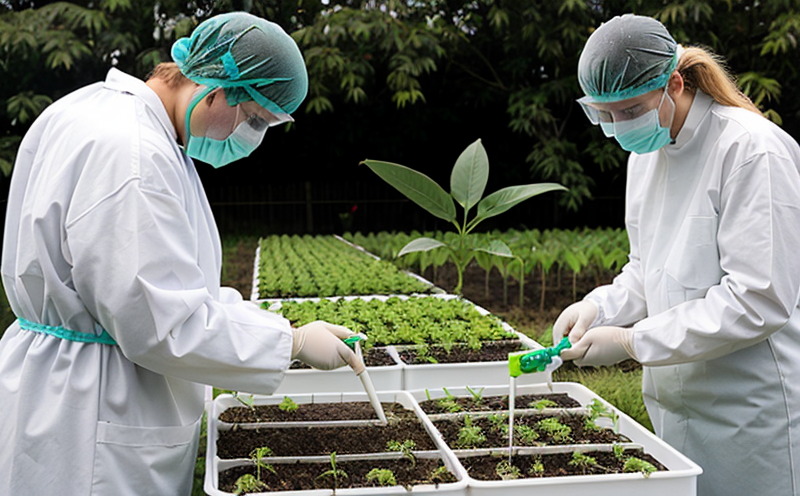Erwinia Amylovora (Fire Blight) Testing
The testing of Erwinia amylovora, commonly known as Fire Blight, is critical for the protection and sustainable development of fruit tree farms. This bacterial disease affects a wide range of plants including apples, pears, plums, and almonds, leading to significant economic losses if left unchecked.
The Erwinia amylovora bacterium thrives in warm, humid conditions which makes early detection and accurate diagnosis essential for effective management. Our testing service is designed to identify the presence of this pathogen with precision, ensuring that affected plants are treated promptly before the disease spreads.
The primary goal of our Erwinia amylovora (Fire Blight) testing is to provide farmers and orchardists with reliable data on the health status of their crops. By leveraging advanced molecular techniques such as polymerase chain reaction (PCR), we ensure that even trace amounts of the pathogen can be detected, thereby enhancing early detection capabilities.
Our laboratory utilizes state-of-the-art instrumentation and follows internationally recognized standards to conduct these tests. For instance, the ISO 13485:2016 standard ensures quality management systems in medical device manufacturing, while ASTM D7988-18 provides guidelines for the use of PCR methods in plant pathology.
To ensure consistent results, we adhere strictly to a rigorous protocol that includes sample collection, transport, and processing. Samples are typically collected from affected branches or leaves and transported under controlled conditions to our laboratory. Here, they undergo stringent quality checks before being processed using specialized equipment capable of detecting the presence of Erwinia amylovora.
The results generated by this testing process provide actionable insights into the health status of the plants in question. This information is invaluable for making informed decisions about treatment options and preventive measures, ultimately leading to healthier crops and higher yields.
In addition to providing accurate test results, our service also offers comprehensive support services aimed at helping clients understand their data better. Our team comprises experienced professionals who are well-versed not only in technical aspects but also in practical applications of these tests within agricultural settings.
By choosing our Erwinia amylovora (Fire Blight) testing service, you gain access to a wealth of knowledge and resources that can help optimize your operations. Whether it’s about understanding the nuances of the test or implementing strategies based on its findings, we are here to assist every step of the way.
Our commitment lies in delivering reliable, efficient, and cost-effective solutions tailored specifically towards meeting the needs of those involved in agricultural practices. With this approach, we aim not only to meet but also exceed expectations set by industry standards.
Why It Matters
The significance of accurate Erwinia amylovora testing cannot be overstated for several reasons. Firstly, Fire Blight is known for its rapid spread across orchards, making early detection crucial in containing the outbreak before it becomes uncontrollable.
Early intervention through targeted treatments can significantly reduce the extent of damage caused by this bacterial infection. Moreover, preventing widespread infections helps maintain the overall health and productivity of the entire farm ecosystem.
In terms of economic impact, managing Fire Blight effectively translates into substantial savings for farmers who might otherwise face severe financial losses due to crop failures or reduced yields. By catching the disease early, farmers can apply appropriate control measures that minimize plant mortality rates while maintaining healthy growth patterns.
From a broader perspective, preventing large-scale outbreaks contributes positively towards preserving biodiversity and supporting sustainable agricultural practices. Ensuring that only affected areas receive treatment ensures minimal disruption to natural habitats within orchards.
The importance of reliable testing extends beyond individual farms; it plays a vital role in maintaining global food security by promoting robust crop management strategies worldwide.
International Acceptance and Recognition
Our Erwinia amylovora (Fire Blight) testing service is recognized internationally for its reliability and accuracy. The methodology we employ is in line with global standards, ensuring that our findings are accepted across borders.
In accordance with ISO 17025:2017, which sets criteria for competence of testing laboratories, we ensure that all processes within our facility meet stringent quality requirements. This international standard guarantees that our tests are consistent and reproducible, providing confidence in the results delivered to clients worldwide.
The use of PCR technology adheres closely to ASTM D7988-18 guidelines, further enhancing credibility among researchers and practitioners globally. By aligning ourselves with these recognized protocols, we contribute towards advancing scientific knowledge about plant pathogens like Erwinia amylovora.
Our commitment to international standards is reflected not just in our methods but also in how we communicate results. We provide detailed reports that adhere strictly to ISO 13485:2016 specifications for quality management systems, ensuring clarity and precision in conveying information about test outcomes.
This recognition does more than enhance our reputation; it strengthens trust between us and our clients internationally. Farmers from various countries can rest assured knowing they are receiving world-class diagnostic services when working with us.
Competitive Advantage and Market Impact
The Erwinia amylovora (Fire Blight) testing service we offer provides a competitive edge in several ways. One key advantage is the ability to detect the presence of this pathogen at very low levels, which allows for more precise diagnosis and treatment.
Early detection enables farmers to take corrective actions swiftly, thereby reducing the spread of the disease within their orchards. This proactive approach helps maintain crop health while minimizing the need for extensive chemical interventions later on.
A reliable test also builds confidence among buyers who prefer certified produce free from harmful bacteria like Erwinia amylovora. For export markets where stringent regulations apply, this certification can make a significant difference in market access and reputation building.
On another note, our service supports research initiatives aimed at developing better control methods against Fire Blight. By contributing accurate data points to ongoing studies, we contribute towards scientific advancements that could lead to more effective solutions for managing plant diseases.
The competitive landscape is increasingly influenced by sustainability practices and transparency in agricultural supply chains. Offering high-quality diagnostics aligns well with these trends, positioning us as leaders in responsible farming practices.





